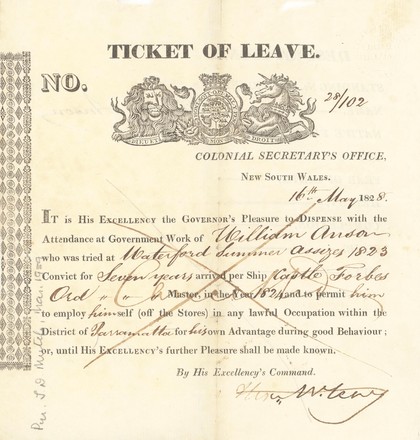A ticket of leave convict
A
ticket of leave allowed a convict to work for his own benefit and to acquire
property on the conditions that he resided within a prescribed area, attended a
muster every few months and attended church weekly. The tickets had to be
renewed annually and permitted the convicts to marry or bring their families
over from England or wherever they lived. They weren’t allowed to carry
firearms or board a ship, but once the convict observed these conditions for
half their prison sentence the restrictions were removed. Although the convicts
still couldn’t leave the colony until the full sentence had been served.
‘The ticket-of-leave man’ lyrics
By From Warren Fahey's 'Australian Folk Songs and Bush Ballads'. Lyrics collected by Hugh Anderson and Ron Edwards from English broadside ballads. Sung to the traditional tune Pretty Polly Perkins.
Once
I was honest and worked at my trade
Which was shoemaker and good shoes I made,
Till once a fine fellow came into my place,
And he was the cause of my present disgrace.
CHORUS:
He was a Ticket of Leave man, still inclined for to thieve,
Although he was out on a Ticket of Leave
He came to my shop and quickly 'twas,
He ordered some boots and he ordered some shoes,
For a twenty pound note, then, the change he did receive,
I was sold by a Ticket of Leave
A week after this note I did cash,
It was forged and for me was a regular smash,
They made me an example and sent me away,
And gave me seven years at Botany Bay.
But every convict bear this in sight,
May he again receive this freedom, if he acts right,
And the government there my story did believe,
And I had but one year and a Ticket of Leave.
Arrived here on shore, I idleness do shirk,
And tried like a man to look for some work.
But all the folks I saw did the one answer give,
Where's the Police, you're a Ticket of Leave.
I'm scorned by the rich, I'm scorned by the poor.
My ticket drives me mad, from door to door,
And now ere a week or fortnight is pass'd
They make me a thief and dishonest at last.
And this will be the end of the poor
Ticket of Leave Man, who is not inclined to thieve
Although I'm free, with my Ticket of Leave,
And who do you think would employ a Ticket of Leave?
Good behaviour
By AustralianHistory.org, 2013
Good
behaviour meant that convicts rarely served their full term and could qualify
for a Ticket of Leave, Certificate of Freedom, Conditional Pardon
or even an Absolute Pardon. This allowed convicts to earn their own living and
live independently. However, for the period of their sentence they were still
subject to surveillance and the ticket could be withdrawn for misbehaviour.
This sanction was found to work better in securing good behaviour then the
threat of flogging. The ticket of leave licences were developed first to save
money, but they then became a central part of the convict system which provided
the model for later systems of probation for prisoners. Governor King
(1800-1804) first issued tickets of leave to any convicts who seemed able to
support themselves, in order to save on providing them with food from the
government store. The tickets were then used as a reward for good behaviour and
special service, such as informing on bushrangers. Gentlemen convicts were
issued with tickets on their arrival in the colony although Governor Macquarie
(1810-1821) later ordered that a convict had to serve at least three years
before being eligible.
Governor
Brisbane (1821-1825) finally set down regulations for eligibility. Convicts
normally sentenced to seven year terms could qualify for a Ticket of Leave
after four years, while those serving 14 years could expect to serve between
six to eight years. 'Lifers' could qualify for their 'Ticket' after about 10 or
12 years. Those who failed to qualify for a pardon were entitled to a
Certificate of Freedom on the completion of their term.



 Back to list
Back to list